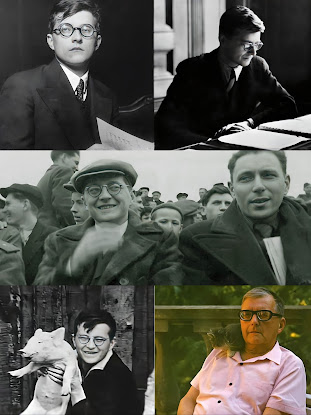HAPPY BIRTHDAY, DMITRI!
It's been a pretty awful day overall, but the last few hours have been repaired, rejuvenated in the rejoicing in the celebration of one the composers whose work has influenced, changed, and bettered my existence into something far more than merely that.
Dmitri Dmitriyevich Shostakovich lived a good bit longer than Mozart, but it was by no means a long life. Living to only 68 (as I approach those years myself, it seems frightfully young) and enduring Soviet era horrors, defamation, hardship, censorship and having his creativity stifled, what emerged as his catalog is nothing but triumph - even when we see it and hear it at its most intimate and harrowing moments, of which there is no shortage of.
Upon Stalin's death one can hear something of a shift in his style, as Clemency Burton-Hill wrote:
. . . you can almost feel in his music, the gigantic breath of relief as he could start to publish not just the 'desk drawer' works he’d kept under wraps for years, including the Fourth Symphony, but also works in which he could openly give musical expression to the brutalities he and his contemporaries had endured under Stalin’s purges.
Shostakovich himself wrote:
Without party guidance I would have displayed more brilliance, used more sarcasm, I could have revealed my ideas openly instead of having to resort to camouflage.
Even so, what he was able to do with that camouflage revealed genius on a level we rarely see. The brain of this man . . . the heart of this man . . . the courage of this man was remarkable. Even more so when one learns he suffered from an almost crippling shyness, was a bundle of nerves, cautious to a fault and it's no bloody wonder considering all he endured. Watching family and his closest friends rounded up, sent off to the gulag or executed. Shostakovich himself barely escaped this fate and only because the officer assigned to interrogate him was arrested and Dmitri somehow slipped through.
Shostakovich had all kinds of ticks - obsessed with neatness and order, cleanliness,his daughter wrote of his synchronizing every clock, writing letters to himself to test the reliability of the postal service, and such.
Given his brief time on the planet, Shostakovich was able to crank out an astonishing amount of music . . . BIG music. 15 symphonies, six concerti, ballets, operas, a musical, endless chamber and solo music, film scores, theatre music, song cycles - his output is dizzying, and brilliant. He was known to sit at his table and write out a complete score without stopping, which seems . . . well, frankly impossible. For normal humans, it is. But, if you're a genius and gifted with a photographic memory . . . if you've worked every detail out in your head, maybe not. Shostakovich described his compositional method as "think long,, write fast."
I always found it fascinating that Shostakovich was such a football fan, and was shocked when I first learned his ballet, The Golden Age was . . . a ballet about football. That tidbit of information was, to this then young musician, about as cool as cool gets.
As a young pianist and already obsessive collector, I grew up with an oddball collection of favorite composers at my side whose music has been part of the soundtrack of my life - at the top of that list are two names: Bach. And Shostakovich.
Tonight I've enjoyed, laughed, cried, and gotten the shivers from a few personal favorites : Nadja Salerno Sonnenberg and Dmitri's boy Maxim, in the First Violin Concerto; a slew of Preludes and Fugues, Symphony No. 4 (Alain Altinoglu and the Frankfurt Radio Symphony) 10 and 11 (Mstislav Rostropovich and the National Symphony).
The night has just ended with a live (recorded earlier today) Birthday Concert from Moscow with the Tatarstan Symphony Orchestra led by Alexander Sladkovsky performing the Second Cello Concerto with Cellist, Alexander Knyazev (and who played an encore from the 3rd Bach Cello Suite, which seemed fitting), and Symphony No. 8. The Tartarstan is not one of the world's great orchestras, but nobody seems to have told them, and so they play as if they are. There were a few moments that could have been better, but overall the playing was inspired, solid, and offered a beautifully hushed ending more famous ensembles might want to look at and listen to.
I couldn't help but smile REALLY BIG when after an extended ovation, Maestro Sladkovsky turned his back to the house, raised his baton, and launched his musicians into the most appropriate of encores: Waltz No. 2 from the The Suite for Variety Orchestra No. 1, Perfect.
[Poscript: This is the original photo collage I used for this birthday tribute. To my utter horror . . . the upper right hand photo is something I did not catch. It IS Dmitri's head, but superimposed onto the body of Harry Potter (a series of films I've never watched, but whose hero apparently looked very similar to Shostakovich). Here is the photo collage I was going to replace it with - but now just adding because - how cool is it that pop culture is trying to steal Dmitri Shostakovich for its own purposes?]
Labels: Bach, Knyazev, Shostakovich, Sladkovsky, Tatarstan Symphony



